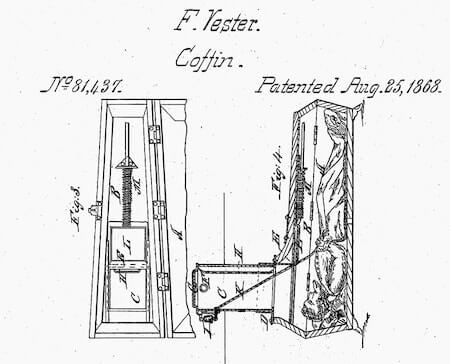Saved by the bell
What's the meaning of the phrase 'Saved by the bell'?
Saved by a last minute intervention.
What's the origin of the phrase 'Saved by the bell'?
There is a widespread notion that 'saved by the bell' originated as an expression that relates to people being buried alive. The idea was that, if someone were comatose and mistakenly pronounced dead and interred, they could, if they later revived, ring a bell that was attached to the coffin and be saved. The idea is certainly plausible as the fear of being buried alive was and is real. Several prominent people expressed this fear when close to death themselves:
"All I desire for my own burial is not to be buried alive." - Lord Chesterfield, 1769.
"Have me decently buried, but do not let my body be put into a vault in less than two days after I am dead." - deathbed request of George Washington.
"Swear to make them cut me open, so that I won't be buried alive."- Frederic Chopin's last words.
Just as real were the devices themselves, several of which were patented in England and in the USA. These were known as 'safety coffins' and designs were registered in the 19th century and up to as late as 1955; for example:

The Improved Burial Case.
Patent No. 81,437 Franz Vester, Newark, New Jersey.
August 25, 1868.
As well as a handy bell, Vester's device had the novel enhancement of a glass screen to view the coffin's occupant. Presumably the mourners could wave to the deceased and, if he waved back, they knew they were on to something.
There's no evidence to show that anyone was ever saved by these coffins or even that they were ever put to use, and there's a similar lack of evidence of the phrase 'saved by the bell' ever being used in that sense prior to it having been used in other contexts.
In fact, the expression is boxing slang and it came into being in the latter half of the 19th century. A boxer who is in danger of losing a bout can be 'saved' from defeat by the respite signalled by bell that marks the end of a round. The earliest reference to this that I can find is in the Massachusetts newspaper The Fitchburg Daily Sentinel, February 1893:
"Martin Flaherty defeated Bobby Burns in 32 rounds by a complete knockout. Half a dozen times Flaherty was saved by the bell in the earlier rounds."
There are other popular etymological fallacies related to death - notably dead ringer and graveyard shift.

